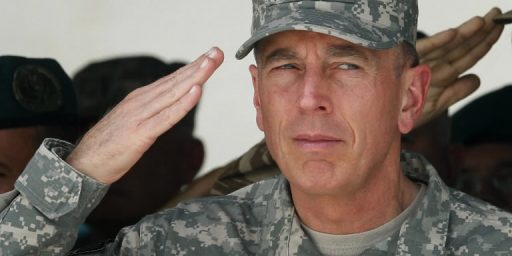Iraq Progress Metrics
Austin Bay wonders what metrics General David Petraeus will use in his report next month on our progress in Iraq. Let’s, for the sake of argument, accept the notion that Petraeus will actually write (by which I mean, staff out to his subordinates, read and comment upon, and sign) the report, not merely serve as the spokesman for something written by staffers at the White House. If so, Bay’s 13-point checklist looks about right.
Independently, Kingdaddy offers a six-point checklist that incorporates the same concepts in a more consolidated fashion:
- The frequency of violence drops. This statistic is the simplest, which should make you immediately suspicious of how well it describes the complex reality of a war.
- The type of attack changes. You might see a switch from raids on military targets to terror attacks on civilians and conclude that the guerrillas are getting more desperate. On the other hand, even desperate measures may still undermine the regime’s political base.
- The size of guerrilla groups drops. The simple equation is, progress equals fewer insurgents. However, that begs the question of how big a revolutionary movement needs to be. Since few successful revolutionaries enjoyed the approval of a majority of the population, size matters only to a point.
- Recruitment into guerrilla groups slows or stops. The political appeal of the insurgents may wane, or the government may be dismantling these organizations faster than the guerrillas can re-build them.
- The quality of intelligence about the insurgents improves. Improvements in the amount and quality of information about guerrillas can be a measure of both the government’s improved effectiveness, and the revolutionaries’ decreasing effectiveness.
- The government increasingly governs. In other words, the regime’s political, administrative, judicial, and police organization function, without competition, in an increasing number of regions. Obviously, this return of the government needs to be permanent, to be permanent, the regime needs to achieve some amount of acquiescence and support.
He argues, correctly in my view, that the last is far and away the most important.
Fewer guerrilla attacks, shrinking insurgent organizations, more information about the guerrillas—these are the preconditions for a final step, when an embattled regime re-ascends the seat of power. Many regimes fail to take that last step. […] Any escalation of military, police, and intelligence efforts can, at best, create an opportunity for the regime. The regime may be unable to seize that opportunity, often because of the grave political defects that allowed the insurgency to arise in the first place.
Without quite specifying their metrics, Foreign Policy magazine’s panel of experts think we’re failing:
More than half say the surge is having a negative impact on U.S. national security, up 22 percentage points from just six months ago. This sentiment was shared across party lines, with 64 percent of conservative experts saying the surge is having either a negative impact or no impact at all. When the experts were asked to grade the government’s handling of the Iraq war, the news was even worse. They gave the overall effort in Iraq an average point score of just 2.9 on a 10-point scale. The government’s public diplomacy record was the only policy that scored lower.
These negative opinions may result in part from the experts’ apparent belief that, a decade from now, the world will still be reeling from the consequences of the war. Fifty-eight percent of the index’s experts say that in 10 years’ time, Sunni-Shiite tensions in the Middle East will have dramatically increased. Thirty-five percent believe that Arab dictators will have been discouraged from reforming. Just 5 percent, on the other hand, believe that al Qaeda will be weaker, whereas only 3 percent believe Iraq will be a beacon of democracy in the Middle East. If true, the surge, or any other tactical shift for that matter, was probably already too little, too late.
One thing that almost everyone agrees is that things aren’t going to be noticeably better, especially on the all-important political front, next month.






Well, given that the Iraqi gov’t is taking August off, that’s pretty self-evident. Unfortunately, when you take into account that Austin & you are correct about the most important indicator – the gov’t increasingly governing – it pretty much puts the lie to the surge having any net positive impact. It’s nice that we’ve re-painted the living room, but the actual house is still on fire…
Metrics shmetrics. The Petraeus report is moot, anyway, except insofar as it provides political cover for the U. S. political leadership to do what they’re already planning to do. This is true of Republicans and Democrats, protestations of the netroots notwithstanding. Note that in the Democratic “debate” yesterday all of the first-tier Democratic candidates defended their positions, i.e. to leave a substantial “residual force” in Iraq for the foreseeable future against Bill Richardson’s challenge for a justification (and Dennis Kucinich’s condemnation).
The critical questions in my view are whether the worst case scenario is sufficiently worse than the status quo and how likely it is to come to pass. I believe that intelligent people can differ on this but I’ve got to admit that I find it nerve-wracking that those who favor immediate withdrawal rely so heavily on rosy predictions that I find hard to reconcile with the incentives in place.